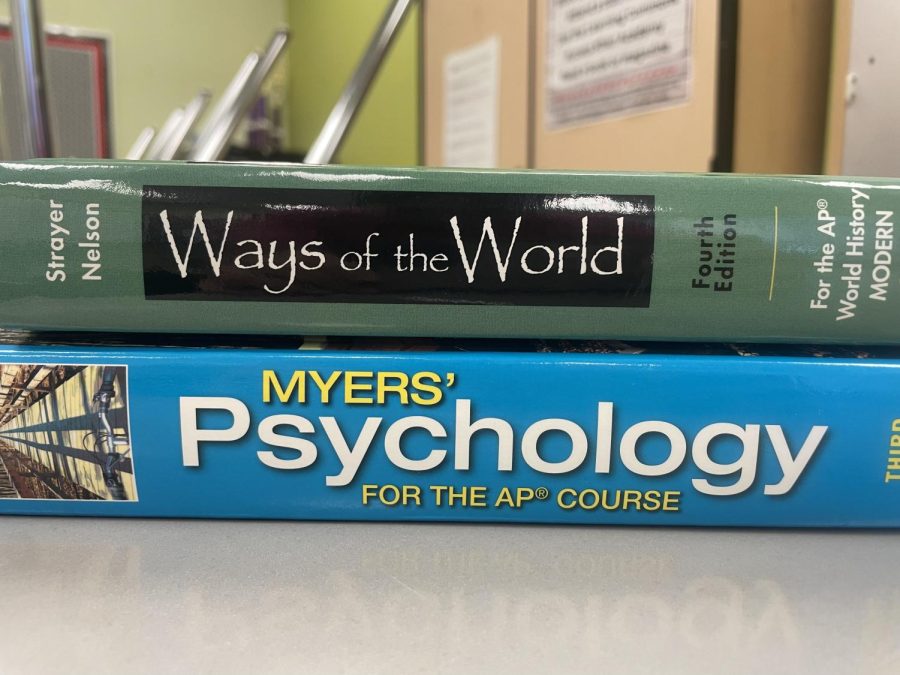Exam crunch time: Do fall AP classes disadvantage students under FCPS block schedule?
Two of the AP classes offered at Linganore High School are AP World History and AP Psychology, which both have hefty textbooks.
May 30, 2023
As students approach the end of the school year, they also approach the chaotic, 30-day period of school-wide testing that is more commonly referred to as May.
One group of tests the most anxiously anticipated by students are AP exams. These exams are cumulative assessments of knowledge on a specific subject, learned during whichever AP course a student has taken during the school year.
A lot of stress comes along with these tests. Depending on the score a student receives on their AP exam, they might be eligible to earn college credit for the corresponding course (College Board considers a 3 to be a passing score, but many schools require 4s or 5s in order to earn college credit).
College courses are expensive, so many students stress about getting the best score possible in order to relieve some of the financial burden that comes with pursuing a higher-level education.
For the lucky students who take their AP courses during the spring semester, preparing for an AP exam involves brushing up on earlier content, practicing test questions and perfecting writing skills (if needed for their test).
For those scheduled to take their AP class in the fall, preparing for an AP test is a very different process. Students who take AP courses in the fall complete their course at the end of January, three months before they sit for the exam. Students in these fall courses often have to relearn large chunks of content, along with test- taking skills and writing practice.
Adding to the stress and workload of fall AP students are the current classes they are enrolled in during the spring semester. Many students take additional AP and/or honors courses during their second semester, which means more tests and difficult assignments to prepare for at the same time they are relearning content for fall APs.
This discrepancy in the learning and test preparation process has been known to have a negative effect on fall AP students come test time in May.
An Analysis of AP test scores from fall and spring students have shown that spring students generally perform better on the exam. But the question remains– are these score discrepancies a result of FCPS block scheduling, or is it up to students to earn the score they want?
Many theories attempt to explain the impact a lack of continuous learning has on content retention.
German psychologist Herman Ebbinghaus is the author of a popular theory called the Ebbinghaus Forgetting Curve, which demonstrates that without reinforcing past knowledge, information is lost quicker than expected. Ebbinghaus concluded that after one day, one loses 66% of what was learned, 75% after six days and so forth.
Linganore AP Government teacher Jamie Hendi says that while she does see a drop in scores from her spring to fall students, this could be prevented if more students properly prepared themselves for the exams.
“I’ve assigned practice exams in AP Classroom,” Hendi said. “I have a whole review group for my kids so they can access the materials they need.”
In addition to these resources, Hendi also holds review sessions for her students to brush up on content and practice test questions.
Many other AP teachers throughout Linganore host review sessions as well. These sessions are often held during prep or before and after school and are a great way for both fall and spring semester students to brush up on content and get assistance from their teachers.
To get the most out of the sessions, however, students have to attend the scheduled review sessions.
“If a kid is waiting until the weekend before test day to start studying … You’re not doing what you need to… Make a review schedule, plan out your study “If a kid is waiting until the weekend before test day to start studying … You’re not doing what you need to,” Hendi said. “Make a review schedule, plan out your studying, and come to review sessions!” — Jamie Hendi
Hendi says that while her first review session usually draws a decent crowd, fewer students show up for subsequent sessions.
“There is a core group that shows up for review sessions and practice, but most of them[other AP students] I’m not hearing from at all,” Hendi said. “I’ve been doing a mix of prep and after school sessions, but they just aren’t coming.”
Some students believe that the difference in exam scores relies more on the schedule structure than study efforts.
Frederick County Public Schools (FCPS) runs on a block schedule, which means students take four classes during the first semester then switch to four different classes during the second semester.
This switch can be challenging for fall semester AP students whose workload for their class does not necessarily end along with the term.
Linganore junior Autumn Rhinehart has taken three AP classes during her time at Linganore, two of which were fall classes.
“It’s really hard to learn about something for an entire semester and then have to wait three months to take the exam,” said Rhinehart.
However, this block schedule has its benefits as well.
As opposed to a traditional seven-bell schedule, block scheduling only has four classes a day. With a seven-hour long school day, a traditional bell schedule allots roughly 50 minutes for each class. Maintaining the same school day length with block scheduling means that students spend around an hour and twenty minutes in each class, over half an hour longer than a traditional bell schedule.
These longer class times give teachers more time to teach content and work with their students on classwork and activities. It offers students more opportunities to get help with challenging work, and in some cases, students are able to get their homework done in class.
For AP teachers and students, these longer classes can be a blessing.
“If we had shorter classes, I don’t think I would be able to understand material as well,” Rhinehart said. “Longer classes give me more time to ask questions and get help instead of getting stuck on something at home.”
While this type of schedule does pose challenges for AP students, the benefits of block scheduling appear to ultimately outweigh its flaws.
Unfortunately, for future fall AP students, this means that securing a good exam score will come down to proper preparation and good study habits.
Hendi stresses the importance of starting to study well before the test date.














